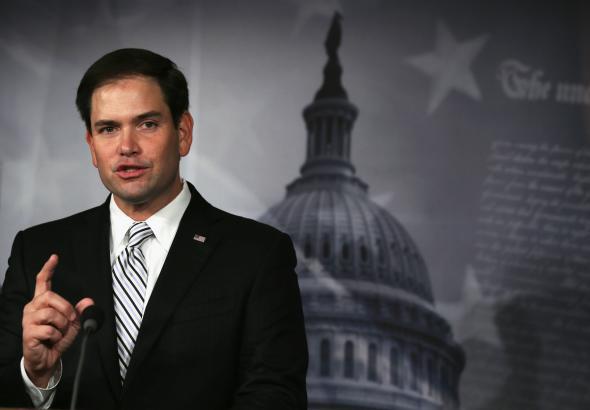Sahil Kapur is out with an informative piece about Sen. Marco Rubio’s doomed-from-birth attempt to undermine the Affordable Care Act by repealing the pool for insurers in the “risk corridor.” It’s fairly simple—the ACA as constructed includes a bunch of money to be doled out to insurers if they end up with riskier groups of people in the exchanges than they had expected. Rubio’s office frames this with one of the most reliable buzzwords in Republican politics:
“We need to protect taxpayers from having to bail out anyone as a consequence of ObamaCare,” Alex Conant, a spokesman for Rubio, told TPM in an email. “Rubio’s bill will fully repeal the risk corridor provision in Obamacare, preventing a bailout under the existing risk corridor provision of Obamacare.”
But how brilliant is it, as (to use the word Jon Gruber uses with Kapur) trolling? “Repealing the risk corridors is good policy and strategically smart,” says Cato Institute scholar Michael Cannon, who was recently named one of the law’s most effective underminers by TNR.
ObamaCare has two basic features. The first are the community-rating price controls, which force insurance companies to cover the sick at premiums well below cost. The second is a bazillion different provisions designed to funnel money to insurance companies so they don’t go out of business. (See, e.g., the individual mandate, premium-assistance tax credits, cost-sharing subsidies, risk adjustment, reinsurance, marketing restrictions, network adequacy requirements, etc., etc.). The risk corridors are one such provision. They tax carriers that got relatively few sick people and give the money to carriers that got relatively more.
Repealing the risk corridors doesn’t increase the cost of the law. It shifts part of the cost back to insurance carriers, by preventing the government from shifting that cost from Carrier A to Carrier B. This will make Carrier A unhappy, perhaps to the point where it will no longer participate in the Exchanges, and maybe even to the point where it will join the chorus demanding that Congress reopen the law. Since Carrier B probably doesn’t know in advance whether it will be a net payer or recipient under the risk corridors, Carrier B may respond exactly the same way. Which is another way of saying that the uncertainty associated with repealing the risk corridors could motivate all insurers – a powerful and now-supportive interest group – to switch sides on ObamaCare.
So it sounds good, as a sneak attack. But Rubio’s hardly sneaking, is he? He’s approaching this with all the foresight of Auric Goldfinger leaving James Bond on the table and walking away, assuming the laser will get the job done.
